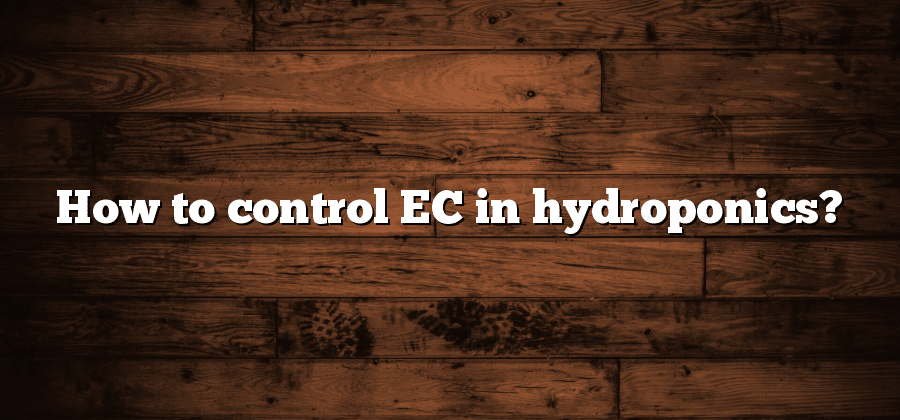Understanding Electrical Conductivity in Hydroponics
Electrical conductivity (EC) is a fundamental concept in hydroponics, playing a critical role in determining nutrient levels and overall plant health. In simple terms, EC refers to the ability of a solution to conduct electricity. Since hydroponic systems use nutrient solutions instead of soil, monitoring and maintaining proper EC levels is crucial for providing essential elements to plants.
The conductivity of a solution is primarily influenced by the concentration of dissolved minerals and salts. The higher the concentration of dissolved ions in the solution, the more conductive it becomes. EC levels in hydroponics are measured in millisiemens per centimeter (mS/cm), with different plants requiring different ranges of EC for optimal growth. High EC levels can lead to nutrient imbalances and plant stress, while low EC levels can result in nutrient deficiencies and stunted growth. Therefore, understanding and controlling EC levels is key to achieving successful hydroponic cultivation.
The Importance of Maintaining Proper EC Levels in Hydroponics
Maintaining proper EC (Electrical Conductivity) levels in hydroponics is crucial for the overall success of your system. EC levels measure the concentration of minerals and nutrients in the nutrient solution, indicating how well the solution can conduct electricity. The optimal EC levels ensure that your plants receive the correct balance of nutrients, providing them with the essential elements they need for growth and development.
When EC levels are too low, it indicates an insufficient nutrient concentration, potentially leading to nutrient deficiencies and stunted plant growth. Conversely, high EC levels suggest an excess of nutrients, which can result in nutrient toxicity and damage to plants. Therefore, it is essential to monitor and adjust EC levels regularly to maintain a steady and balanced nutrient concentration in your hydroponic system. By doing so, you can ensure the health and productivity of your plants, ultimately maximizing your hydroponic yields.
Selecting the Right EC Meter for Accurate Measurements
When it comes to hydroponics, maintaining proper electrical conductivity (EC) levels in the nutrient solution is crucial for the overall health and productivity of the plants. To ensure accurate measurements of EC levels, selecting the right EC meter is of utmost importance.
First and foremost, it is essential to choose a reliable and high-quality EC meter that is specifically designed for hydroponic applications. There are various types of EC meters available on the market, ranging from handheld pen-style meters to more technologically advanced digital meters. It is recommended to opt for a meter that offers a wide measurement range and has automatic temperature compensation (ATC) capability. ATC is particularly important as it adjusts the EC reading according to the temperature, ensuring accurate measurements regardless of variations in the nutrient solution’s temperature. Additionally, it is advisable to select a meter with a replaceable electrode or probe, as this allows for easy maintenance and prolongs the lifespan of the meter.
Monitoring and Adjusting EC Levels in Hydroponic Solutions
Maintaining proper electrical conductivity (EC) levels in hydroponic solutions is essential for ensuring optimal plant growth and development. EC is a measure of the solution’s ability to conduct an electric current, which is influenced by the concentration of dissolved salts and ions. Monitoring and adjusting EC levels is a crucial aspect of hydroponic cultivation, as it allows growers to provide plants with the precise nutrient concentrations they need.
Regular monitoring of EC levels is necessary to ensure that plants are receiving the right amount of nutrients. This can be done by using an EC meter to measure the electrical conductivity of the hydroponic solution. By comparing the readings to recommended ranges for different stages of plant growth, growers can identify any deviations and make necessary adjustments. This ensures that plants receive the appropriate nutrient concentration for their specific needs, allowing them to thrive and produce high-quality yields. Additionally, maintaining proper EC levels helps prevent nutrient imbalances, which can lead to nutrient deficiencies or toxicities, negatively impacting plant health.
Balancing Nutrient Concentration for Optimal EC Control
When it comes to hydroponics, achieving optimal electrical conductivity (EC) control is crucial for the success of your crops. One important aspect of maintaining proper EC levels is finding the right balance of nutrient concentration in your hydroponic solution.
Balancing nutrient concentration involves carefully measuring and adjusting the amount of essential elements in your nutrient solution to ensure it matches the specific needs of your plants. Too high of a nutrient concentration can lead to an increase in EC levels, which can cause stress and nutrient imbalances in your plants. On the other hand, too low of a nutrient concentration can result in nutrient deficiencies and poor plant growth. Achieving the optimal nutrient concentration is a delicate process that requires regular monitoring and adjustment to ensure your plants are receiving the precise amount of nutrients they require for healthy growth.






